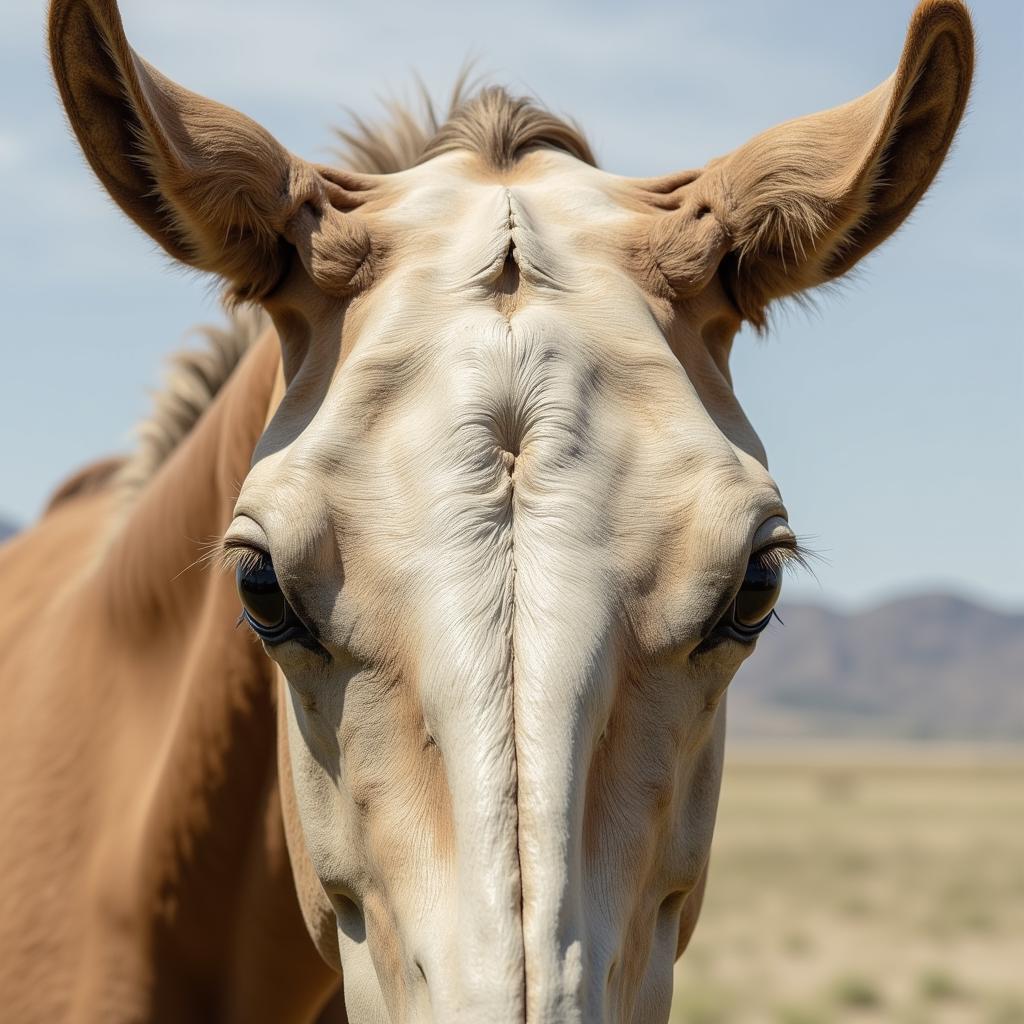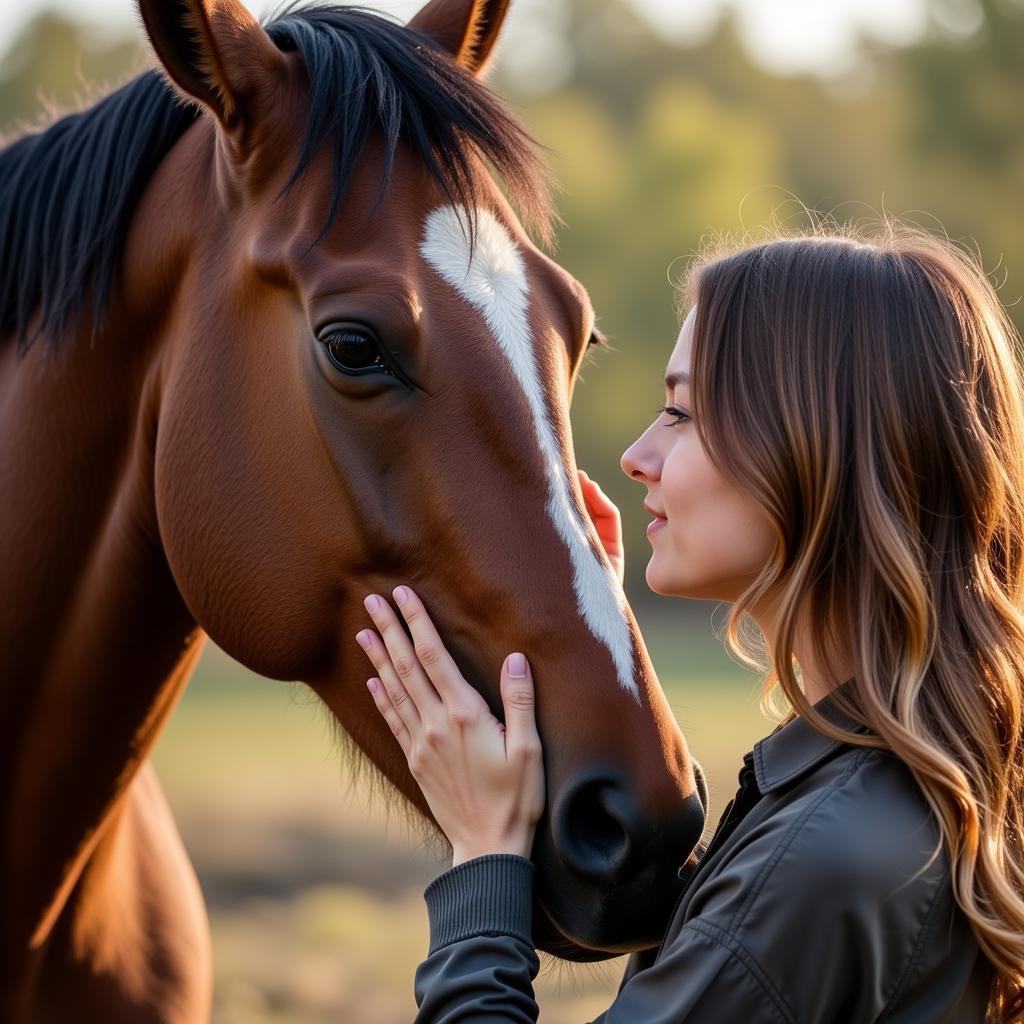The image of a majestic horse, its mane flowing in the wind, is a captivating sight. But what about the image of a horse with horns? Is that even possible? The simple answer is no, horses do not have horns. While mythical creatures like unicorns have cemented the idea of Horse Horns in our minds, the reality is much different. This article delves into the fascinating world of horses, exploring the science behind their anatomy and debunking the myth of the horse horn.
Understanding Horse Anatomy: Why No Horns?
Horses, like all living creatures, have evolved specific anatomical features that help them survive and thrive. To understand why horses don’t have horns, we need to look at their biological makeup.
- Skeletal Structure: A horse’s skull is designed for grazing and lacks the bony core that forms the base of a horn. Horns are typically found on animals like cows, goats, and antelope, and are extensions of their skull.
- Evolutionary Purpose: Horses are prey animals, built for speed and agility to escape predators. Horns, while offering defense for some animals, would add unnecessary weight and potentially hinder their ability to flee from danger.
 Horse Skull Anatomy
Horse Skull Anatomy
The Legend of the Unicorn: Separating Myth from Reality
Unicorns, mythical creatures often depicted as white horses with a single, spiraled horn, have captivated human imagination for centuries. These mythical beings symbolize purity, grace, and even magic. While there’s no scientific evidence to support the existence of unicorns, their enduring presence in folklore and literature demonstrates humanity’s fascination with the unknown and the extraordinary.
What About Other Growths? Differentiating Between Horns and Other Features
While horses don’t have true horns, they can develop other growths on their heads that might be mistaken for them.
- Chestnut: These are small, hardened growths of skin found on the inside of a horse’s legs. While not horns, they are fascinating remnants of evolutionary history, thought to be the remnants of toes from their ancestors.
- Injury-Related Growths: In rare cases, horses may develop bony growths on their skulls due to injury or infection. These are not true horns but rather abnormal bone formations.
If you notice any unusual growths on your horse’s head, it’s crucial to consult a veterinarian to determine the cause and receive appropriate treatment.
Caring for Your Horse: Focusing on Real Needs
Now that we’ve cleared up the myth of the horse horn, let’s focus on the real needs of these magnificent animals. Providing proper care for your equine companion involves:
- Nutrition: A balanced diet of hay, grain, and fresh water is essential for your horse’s health and well-being. Learn about hoof supplements for horses to ensure optimal hoof health.
- Exercise: Regular exercise, whether it’s riding, turnout in a pasture, or other activities, is crucial for maintaining your horse’s physical and mental health. Explore the exciting world of horses roping for a unique and engaging form of exercise for your equine partner.
- Grooming: Regular grooming not only keeps your horse looking its best but also provides an opportunity to check for any injuries or skin conditions.
- Veterinary Care: Routine veterinary check-ups, vaccinations, and dental care are essential for preventing and addressing health issues.
 Bonding with Your Horse
Bonding with Your Horse
Conclusion: Appreciating Horses for What They Are
The myth of the horse horn, while intriguing, is simply that – a myth. Horses, with their incredible athleticism, gentle nature, and undeniable beauty, don’t need horns to captivate our hearts. By understanding their real needs and appreciating them for the magnificent creatures they are, we can ensure their well-being and forge lasting bonds with these remarkable animals.
Remember, if you’re ever unsure about your horse’s health or need expert advice, always consult a qualified veterinarian.
FAQs:
1. Do any horse breeds have horns?
No, no horse breeds have horns. The presence of horns on a horse would be a biological anomaly.
2. Are unicorns real?
While unicorns are prominent figures in mythology and folklore, there’s no scientific evidence to support their existence.
3. What should I do if I find a hard lump on my horse’s head?
It’s essential to contact your veterinarian immediately. While it may be a harmless growth, only a professional can diagnose and recommend the appropriate treatment.
4. Can horses defend themselves without horns?
Yes, horses are well-equipped to defend themselves. They have powerful legs for kicking, sharp teeth for biting, and a strong flight instinct.
5. Are there any places known for their association with horses?
Absolutely! Check out the natural beauty of the Horse Ridge Research Natural Area for a glimpse into the world of wild horses.
Looking for more fascinating insights into the world of horses? Discover the intriguing history and unique characteristics of the Whimsical Horse breed. Remember, a well-equipped horse 1st aid kit is an essential tool for any horse owner.
Need expert advice or assistance with your equine companion? Contact us today! We are committed to providing you with the resources and support you need to ensure your horse’s well-being.
Phone: 0772127271
Email: [email protected]
Address: QGM2+WX2, Vị Trung, Vị Thuỷ, Hậu Giang, Việt Nam
Our dedicated team is available 24/7 to address your concerns and provide expert guidance.